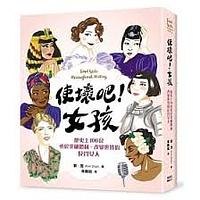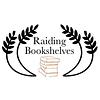Take a photo of a barcode or cover
A fun introduction to a bunch of bad a** women with GORGEOUS portraits of each woman featured. Bravo!
Okay so this book was "complete" at 73%, which kind of bummed me out, but I also understand because I'm sure the bibliography is massive. Anyway.
This was a wonderful, short read about 100 of the baddest women in history. I learned a ton, both about women I've heard of before and about women I didn't even know existed! It's amazing how many women were able to go against the ideal "man's world" and rise to power, get a degree, go to space, fight for women's right to vote, end segregation, etc etc! What's even more remarkable is how many times the word "liberal" popped up. Most of these women were able to accomplish these feats because they had liberal perspectives, or their parents had liberal perspectives, which meant going against the grain and fighting for equality. Wouldn't the world be different if these liberal activists hadn't fought for what they thought was right? And now, "liberal" is a bad word. Funny.
I wish everyone would read this. I wish everyone could see WHY people need to stand up and make their voices heard instead of going with the masses. Nowadays, people protest something they find unjust, and the majority call them "crybabies." Imagine if all the men in America had said, "Oh, they want to vote? What crybabies. Women get to do plenty, they should be happy with what they have." Makes me sick.
I think I just got a little too political but whatever. Read the book. Educate yourself. GO AGAINST THE MASSES!
This was a wonderful, short read about 100 of the baddest women in history. I learned a ton, both about women I've heard of before and about women I didn't even know existed! It's amazing how many women were able to go against the ideal "man's world" and rise to power, get a degree, go to space, fight for women's right to vote, end segregation, etc etc! What's even more remarkable is how many times the word "liberal" popped up. Most of these women were able to accomplish these feats because they had liberal perspectives, or their parents had liberal perspectives, which meant going against the grain and fighting for equality. Wouldn't the world be different if these liberal activists hadn't fought for what they thought was right? And now, "liberal" is a bad word. Funny.
I wish everyone would read this. I wish everyone could see WHY people need to stand up and make their voices heard instead of going with the masses. Nowadays, people protest something they find unjust, and the majority call them "crybabies." Imagine if all the men in America had said, "Oh, they want to vote? What crybabies. Women get to do plenty, they should be happy with what they have." Makes me sick.
I think I just got a little too political but whatever. Read the book. Educate yourself. GO AGAINST THE MASSES!
informative
fast-paced
In the introduction, the author explains that these aren't necessarily "bad" women but are women who broke the socially-accepted rules and carved new path for women. I think the list is overall great. However, I felt there were a few huge exclusions and a few women who didn't really fit the bill. The author does acknowledge this isn't a definitive list, but the list of women in the later half of the book are more about sex symbols and stripteases versus women who worked for equal rights and/or were leading men and women as rulers, ship captains, etc.
A few exclusions that I felt were a bit glaring:
(1) Katharine Hepburn: Leading lady in Hollywood for over 60 years who refused to conform to society's expectations of women, was outspoken, assertive, athletic, and wore trousers before it was fashionable for women. She even wrestled a camera out of a photographer's hand when he took a picture without asking as she was uninterested in the social celebrity lifestyle.
(2) Isadora Duncan: American dancer whose teaching and performances helped to free ballet from its conservative restrictions and presaged the development of modern expressive dance. She rejected the rigidity of the classic ballet and based her dancing on more natural rhythms and movements, dancing barefoot before her audiences.
(3) Jacqueline Cochran: American pilot and the first woman to break the sound barrier on 18 May 1953. She was a pioneer in the field of aviation and one of the most prominent racing pilots of her generation. She was an important contributor to the formation of WWII's Women's Auxiliary Army Corps (WAAC) and Women Airforce Service Pilots (WASP).
(4) Carrie Fisher: American actress, writer, comedian, and very successful Hollywood script doctor. First of all, her performance as Princess Leia, extremely strong willed in a time when most women characters in sci fi/action films screamed and waited to be saved by men. Supporter and advocate for several causes, including women's advocacy, animal rights, and LGBT causes. She was open about her experiences caring for friends who suffered from AIDS, contributing financially to various AIDS and HIV organizations, including hosting a benefit for amfAR. Fisher was one of the first to publicly discuss her diagnosis of bipolar disorder and her addictions, bringing much needed awareness and acceptance of these struggles.
(5) Hatshepsut (1479-1458 BCE): The first female ruler of ancient Egypt to reign as a male with the full authority of pharaoh and the longest reigning female pharaoh in Egypt, ruling for 20 years. She is considered one of Egypt's most successful pharaohs.
In my opinion, the above-mentioned five are a bit more influential for woman versus Gypsy Rose Lee, the woman who innovated the "casual striptease style" (seriously?) or Bettie Page, the most famous pinup girl in history, known as the "Dark Angel" (objectifying women much?) or Bonnie Parker of 'Bonnie and Clyde' fame who was a "cigar" smoking murderess and auto thief (this inclusion really makes the author's earlier statement lose all authenticity-Bonnie is a glorified murder and sources state that her cigar smoking was completely fabricated). I began to notice a pattern of the modern women focusing on "sexual liberation," and that it got a bit old. Maybe that narrow scope was the reason the above mentioned were passed over?
Overall, an interesting look at women through history that I largely enjoyed. I think the pre-modern era women are much more fascinating than some later inclusions (see above). I learned of some fascinating people and appreciated some of the modern-era names I've heard throughout my life but never really understood their contributions. The artwork really put a unique stamp on the book. I'd definitely recommend as a quick read but also an absorbing book with the above caveats.
A few exclusions that I felt were a bit glaring:
(1) Katharine Hepburn: Leading lady in Hollywood for over 60 years who refused to conform to society's expectations of women, was outspoken, assertive, athletic, and wore trousers before it was fashionable for women. She even wrestled a camera out of a photographer's hand when he took a picture without asking as she was uninterested in the social celebrity lifestyle.
(2) Isadora Duncan: American dancer whose teaching and performances helped to free ballet from its conservative restrictions and presaged the development of modern expressive dance. She rejected the rigidity of the classic ballet and based her dancing on more natural rhythms and movements, dancing barefoot before her audiences.
(3) Jacqueline Cochran: American pilot and the first woman to break the sound barrier on 18 May 1953. She was a pioneer in the field of aviation and one of the most prominent racing pilots of her generation. She was an important contributor to the formation of WWII's Women's Auxiliary Army Corps (WAAC) and Women Airforce Service Pilots (WASP).
(4) Carrie Fisher: American actress, writer, comedian, and very successful Hollywood script doctor. First of all, her performance as Princess Leia, extremely strong willed in a time when most women characters in sci fi/action films screamed and waited to be saved by men. Supporter and advocate for several causes, including women's advocacy, animal rights, and LGBT causes. She was open about her experiences caring for friends who suffered from AIDS, contributing financially to various AIDS and HIV organizations, including hosting a benefit for amfAR. Fisher was one of the first to publicly discuss her diagnosis of bipolar disorder and her addictions, bringing much needed awareness and acceptance of these struggles.
(5) Hatshepsut (1479-1458 BCE): The first female ruler of ancient Egypt to reign as a male with the full authority of pharaoh and the longest reigning female pharaoh in Egypt, ruling for 20 years. She is considered one of Egypt's most successful pharaohs.
In my opinion, the above-mentioned five are a bit more influential for woman versus Gypsy Rose Lee, the woman who innovated the "casual striptease style" (seriously?) or Bettie Page, the most famous pinup girl in history, known as the "Dark Angel" (objectifying women much?) or Bonnie Parker of 'Bonnie and Clyde' fame who was a "cigar" smoking murderess and auto thief (this inclusion really makes the author's earlier statement lose all authenticity-Bonnie is a glorified murder and sources state that her cigar smoking was completely fabricated). I began to notice a pattern of the modern women focusing on "sexual liberation," and that it got a bit old. Maybe that narrow scope was the reason the above mentioned were passed over?
Overall, an interesting look at women through history that I largely enjoyed. I think the pre-modern era women are much more fascinating than some later inclusions (see above). I learned of some fascinating people and appreciated some of the modern-era names I've heard throughout my life but never really understood their contributions. The artwork really put a unique stamp on the book. I'd definitely recommend as a quick read but also an absorbing book with the above caveats.
informative
Good read. I learned a little more about women I already knew of and discovered new women unknown to me. The illustrations are amazing.
This book was mildly entertaining. I was thinking, oh right on! 100 Bad Ass Women! Not quite. I did a little analysis (sorry if my numbers aren't exact, I didn't bother going back and recounting) but 78% of the women in this book are white. And maybe 5% are from somewhere other than North America and Europe. This book is supposed to be about how feminism changed the world really, but it completely fails to acknowledge the intersectionality of feminism, and uses some women in here like tokenism. Sure, maybe it's supposed to be a light read, but as I droned through the stories of all the women in the entertainment business I started dozing off - and that's not to say that it was/is easy for women in entertainment! But it was portrayed as glamorous and effortless, and basically denied many of these women their hardships. Also I don't think some of these accomplishments are worthy of celebration, for example, plagiarizing your peers' illustrations in an interview? Hm... I don't know. Spoliers ahead: when I read Marie Antoinette and her portrait artist made the list I questioned it... REALLY? Sure, Marie Antoinette was a queen, and she had style, and spent lots of money, and didn't seem to care what others thought but... Ok. What about the paragraph on Annie Edson Taylor, and correct me if I'm wrong, but she didn't go over the falls because she wanted to be a DAREDEVIL, she did it for the money, because she was in dire need?
My goal is NOT to diminish what these women did (I mean thank you Margaret Sanger for being a player in helping increase access to birth control! And Malala, you LITERALLY put your life on the line for women's education you are a true warrior) - but I believe this book is very biased and a bit narrow-minded.
My goal is NOT to diminish what these women did (I mean thank you Margaret Sanger for being a player in helping increase access to birth control! And Malala, you LITERALLY put your life on the line for women's education you are a true warrior) - but I believe this book is very biased and a bit narrow-minded.
A good introduction to many fascinating women! So cool to see the achievements of different women!
A beautiful book, not just in terms of aesthetic but also content. It made me proud to be female ✨








